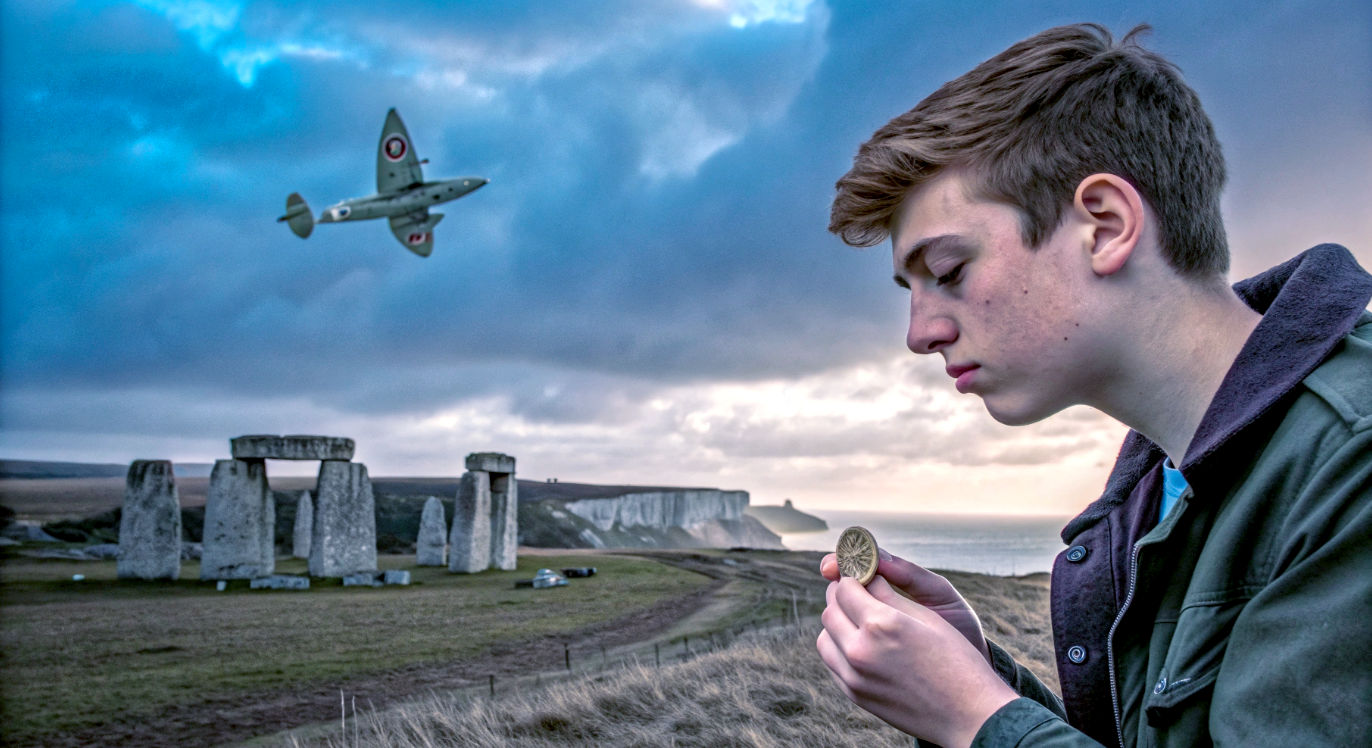Why Is History Important? How the Past Shapes Our Future
Discover why history is more than just dates. Explore how the past shapes our British identity, helps us avoid mistakes, and provides the tools to build a better future.

This post may contain affiliate links. If you make a purchase through these links, we may earn a commission at no additional cost to you.
Have you ever wondered why we bother with dusty old books and stories about people who lived hundreds of years ago? It’s a fair question. You might think history is just a long list of kings, queens, and boring dates. But what if I told you it’s actually more like a gripping detective story, a user manual for the present, and a sneak peek into the future, all rolled into one?
History isn’t just ‘old stuff’. It’s the story of us. It explains why we speak the way we do, why our towns look the way they do, and even why we queue so politely for the bus. From the Roman roads still hiding under our motorways to the NHS we rely on today, the past is all around us. It’s in the DNA of our laws, our culture, and our very identity as Britons.
Understanding history is like having a superpower. It helps us spot patterns, avoid repeating mistakes, and make better choices for ourselves and our communities. It’s the ultimate guide to understanding the messy, wonderful, and complicated world we live in right now. So, let’s pull back the curtain and explore why the past is one of the most powerful tools we have for shaping a better future.
What Exactly Is History? More Than Just Dates and Facts
Before we dive deep, let’s get one thing straight. History isn’t just about memorising when the Battle of Hastings was (1066, by the way!). That’s a part of it, but it’s like saying football is only about the final score. The real magic is in the story—the players, the tactics, the drama, and what it all meant.
The Detective Work of a Historian
Think of a historian as a detective for time. They don’t have a crime scene, but they have clues left behind by the past. These clues are called sources.
- Primary Sources: These are the eyewitnesses. A diary from a soldier in the trenches of World War I, a speech by Winston Churchill broadcast on the radio, or even a piece of pottery dug up from a Roman villa in Somerset. They are raw, direct pieces of the past.
- Secondary Sources: These are like the expert reports. A book written by a university professor about the Tudors or a documentary on Channel 4 about the Industrial Revolution. Someone has already looked at the primary sources and pieced together a story.
A historian’s job is to gather these clues, check if they’re reliable (was that Roman writer just trying to make his emperor look good?), and then weave them into a narrative that explains why things happened. It’s about asking questions: Why did the Vikings sail to Britain? What was it really like to work in a Manchester cotton mill? How did the Windrush generation change British culture?
It’s All About Interpretation
Here’s the tricky part: history is not a perfect, single story. It’s an ongoing conversation, full of debates. Imagine two people watching a football match. One supports Manchester United, the other Liverpool. They’ll probably have very different stories about who played better and why.
History is a bit like that. A historian writing in the 1950s might have a different view of the British Empire than a historian writing today. Neither is necessarily ‘wrong’, but they are looking at the evidence from different perspectives, with different questions in mind. That’s why history is so exciting—it’s always evolving as we discover new evidence and ask new questions. It’s a story that is constantly being retold.
History as Our Memory: Understanding Who We Are
Why do you have memories? They tell you who you are, where you’ve come from, and what you’ve learned along the way. History does the exact same thing, but for entire societies. It’s our collective memory.
Forging a National Identity
What does it mean to be British? Is it about drinking tea, complaining about the weather, and having a stiff upper lip? Or is it something deeper? Our national story is built on shared historical moments.
Think about the Blitz Spirit. During World War II, cities across the UK were bombed relentlessly. The story of ordinary people showing incredible courage, resilience, and community spirit became a cornerstone of British identity. It’s a story we still tell ourselves today when facing tough times. It says something about who we believe we are: determined, united, and unbreakable.
Or consider the NHS. Founded in 1948, it was a revolutionary idea born from the ashes of war—that good healthcare should be available to everyone, regardless of wealth. It’s not just a health service; it’s a symbol of our shared values of fairness and community. When we clap for carers, we’re tapping into that deep historical pride.
These stories, and many others—from the Magna Carta limiting the king’s power to the pioneering spirit of inventors like Isambard Kingdom Brunel—help create a sense of belonging. They are the threads that weave us together.
Personal and Family History
History isn’t just about grand national tales. It’s personal, too. Do you know where your grandparents grew up? What jobs did they do? Maybe they came to Britain from another country, bringing their own stories and traditions with them.
Understanding your family’s past connects you to something bigger than yourself. It can explain why your family has certain traditions or why you live where you do. Services like the National Archives or local history centres allow us to trace our own roots, discovering the everyday lives of people whose choices led directly to our existence. This personal connection makes history feel real and immediate. It’s our story.
Learning from the Past: History as a Guidebook
One of the most famous sayings about history is that “those who cannot remember the past are condemned to repeat it.” While it’s not always that simple, the past does offer a huge library of case studies on what works, what doesn’t, and why.
Avoiding Past Mistakes
History is filled with cautionary tales. The 1929 Wall Street Crash and the Great Depression that followed taught us invaluable lessons about the dangers of unstable financial systems. When the world faced another massive financial crisis in 2008, the responses of governments, including in the UK, were heavily influenced by what went wrong in the 1930s. They knew that doing nothing was not an option.
Similarly, studying the lead-up to World War I and II teaches us about the perils of nationalism, alliances, and failed diplomacy. These lessons helped shape the international institutions we have today, like the United Nations, which were designed to prevent such a global catastrophe from happening again.
Finding Inspiration and Solutions
It’s not all doom and gloom. History is also a source of inspiration. The Suffragettes, who fought tirelessly for women’s right to vote, show us how powerful peaceful (and sometimes not-so-peaceful) protest can be. Their courage paved the way for a more equal society.
When we face big challenges today, like climate change or social inequality, history can offer blueprints. We can look back at how previous generations dealt with huge societal shifts. The Industrial Revolution completely transformed Britain from a rural, agricultural society into an urban, industrial powerhouse. It was a messy and often brutal process, creating immense wealth but also terrible poverty and pollution. By studying it, we can learn about the challenges of managing rapid technological change and its impact on people and the environment—lessons that are incredibly relevant in our own age of artificial intelligence and automation.
History Shapes Our World: Understanding the Present
You can’t understand the news today without understanding the history behind it. Every major issue, from Brexit to conflicts in the Middle East, has deep historical roots.
Making Sense of Current Events
Why is there still tension in Northern Ireland? You can’t grasp the complexities of the situation without knowing about the Plantation of Ulster in the 17th century, the partition of Ireland in 1921, and the decades of The Troubles.
Why did Brexit happen? The story of Britain’s relationship with Europe is a long and complicated one. It’s a tale of island identity, trade, sovereignty, and a historical scepticism of being too closely tied to the continent. Understanding this history helps explain the deep-seated feelings that drove the 2016 referendum result. It wasn’t a decision made in a vacuum; it was the product of centuries of history.
Without this historical context, the world can seem like a confusing and random place. History provides the backstory, the ‘previously on…’, that we all need to make sense of the main event.
How the Past Influences Our Culture and Society
The world we live in is a museum of the past. The buildings we admire, the institutions we trust, and the traditions we celebrate are all historical artefacts.
- Our Language: Why is English such a quirky language, full of odd spellings and words from all over the place? Because of history! It’s a glorious mishmash of Anglo-Saxon, Viking (Norse), Norman French, and Latin, with words borrowed from across the former British Empire.
- Our Laws: The British legal system is built on centuries of tradition, from the Magna Carta (1215), which established the principle that everyone is subject to the law, even the king, to the development of common law through precedent. When a judge makes a ruling, they are participating in a conversation that has been going on for nearly a thousand years.
- Our Cities: Walk through any British city, and you’re walking through time. You might see the remains of a Roman wall in London, a medieval cathedral in York, Georgian terraces in Bath, and Victorian warehouses in Liverpool. Our urban landscapes are living records of our economic, social, and architectural history. The Beeching cuts of the 1960s, for example, reshaped the railway map of Britain and explain why some towns are no longer connected by rail.
History Develops Critical Skills for the Future
Studying history does more than just fill your head with facts. It’s a workout for your brain, building essential skills that are valuable in any job and in life.
Thinking Critically and Analysing Evidence
History teaches you to be a sceptic—in a good way! It trains you not to take everything you read or hear at face value. When you analyse a historical source, you have to ask questions: Who wrote this? Why did they write it? Who was their audience? What biases might they have?
This is an incredibly important skill in the modern world of ‘fake news’ and social media bubbles. Being able to critically evaluate information, weigh up different arguments, and spot a biased source is crucial for being an informed citizen. It’s the difference between simply consuming information and actually understanding it.
Understanding Different Perspectives
History is the ultimate empathy machine. It allows us to step into the shoes of people who lived in a world very different from our own. When you read the letters of a young woman going into factory service in the Victorian era, or try to understand the motivations of a Celtic warrior resisting the Romans, you are forced to see the world from another point of view.
This ability to understand different perspectives is vital. It helps us appreciate cultural differences, communicate more effectively, and become more tolerant and open-minded. In a diverse and globalised world, this is not a soft skill; it’s an essential one.
Crafting a Compelling Argument
Have you ever tried to win an argument with your parents? History teaches you how to do it properly. Writing a history essay involves building a clear, persuasive argument and backing it up with solid evidence. You have to structure your thoughts logically, present your points clearly, and convince your reader that your interpretation is a valid one.
This skill—of constructing a coherent, evidence-based argument—is priceless. It’s what lawyers do in court, what journalists do in articles, what scientists do in research papers, and what you do when you’re trying to get your boss to approve your new idea.
The Future of History: New Questions, New Discoveries
History is not a dead subject. It’s alive, constantly being updated with new discoveries and new ways of looking at the past.
Technology and New Evidence
Technology is revolutionising how we study history.
- DNA analysis can trace ancient migration patterns and even identify the remains of long-lost kings, like Richard III, who was famously found under a car park in Leicester.
- Satellite imagery can uncover lost Roman roads or ancient settlements hidden beneath fields.
- Digital archives are making vast collections of historical documents, from parish records to old newspapers, available to everyone online. You no longer have to travel to a dusty archive to become a historical detective.
A More Inclusive Story
For a long time, the history that was taught often focused on ‘great men’—kings, generals, and politicians. But in recent decades, historians have been working hard to tell a more complete and inclusive story.
- Women’s History: Bringing to light the forgotten stories of women who were scientists, artists, activists, and leaders.
- Black British History: Recognising the long and vital presence of Black people in Britain, from Roman times to the Windrush generation and beyond.
- Working-Class History: Looking beyond the lives of the rich and powerful to understand the experiences of the ordinary people who built Britain.
This isn’t about rewriting history to be ‘politically correct’. It’s about writing a more accurate history—one that reflects the true diversity and complexity of the past. It ensures that everyone can see themselves in our national story.
Conclusion: The Past Is Never Dead
So, why is history important? Because it’s everything. It’s the bedrock of our identity, the instruction manual for our society, and the compass we use to navigate the future. It gives us context for our lives and the world we inhabit.
Without history, we would be adrift, with no understanding of how we got here or where we’re going. We wouldn’t understand our political debates, our cultural treasures, or our national character. We would be more likely to fall for simplistic slogans and repeat the mistakes of those who came before us.
The past is not a foreign country. It’s our home. It shapes our present in countless ways, both seen and unseen. By studying it, we don’t just learn about the past; we learn about ourselves. And by understanding the story of what we have been, we empower ourselves to decide what we want to become. It is, without a doubt, one of the most important subjects we could ever learn.
Further Reading
For those interested in exploring these topics further, here are some highly respected resources:
- The National Archives: The official archive for the UK government, holding records spanning over 1,000 years. A fantastic resource for primary sources. https://www.nationalarchives.gov.uk/
- BBC History: An accessible and wide-ranging collection of articles, podcasts, and documentaries on British and world history. https://www.historyextra.com/ (Home of BBC History Magazine)
- The Historical Association: A UK-based charity dedicated to promoting the study and enjoyment of history at all levels. https://www.history.org.uk/
- British History Online: A digital library of key printed primary and secondary sources for the history of Britain and Ireland. https://www.british-history.ac.uk/
- Historic England: The public body that champions and protects England’s historic environment. Their website is a treasure trove of information about historical places. https://historicengland.org.uk/




